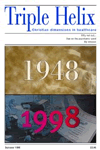Memory can be fatally flawed. Some years ago the BBC asked for memories of those who went to the Festival of Britain when it first opened. I knew I took my girlfriend on the second day, but she kept her diary and as husband and wife we later compared events. Our memories were somewhat different.
So my memories of the start of the National Health Service may be open to historical correction. What is certain is that I was in my final year as a medical student at St Thomas's in London. Feelings were high and partisan. When someone painted 'BOOT OUT BEVAN' in large capitals on the river wall facing the House of Commons, the Secretary of the Medical School disclaimed all responsibility on the grounds that it was not on hospital property, but when an old St Thomas's man sent him a cheque for a celebratory dinner, it somehow found its way to the Doctors' Mess at St Thomas's House.
Certain distinguished doctors could no doubt tell more. It was generally believed that three teams of three painted one word each. The rope team who lowered the painters over the river wall were strong men from the rugby club. It was done so quickly that they were even able to go back and touch it up before ringing the press, and there was time for it to be pho-tographed before tarpaulins were thrown over it by workmen.
Some institutions fared better than others. St Thomas's preserved its endowments by putting them all in the name of the medical school. On the other hand Leicester Royal, which had just collected several million to build a new department, saw it all disappear into the Treasury on nationalisation.
Some notable figures apparently never took their NHS salary, presumably to preserve their independence. Many years later, though, I invited Mr Harold Edwards, for whom I had worked at King's College Hospital, to lecture at a college where I taught in Warwickshire. He said the NHS was the best thing that ever happened to him. Before the War he worked at King's for a small honorarium. He did his private consulting and then in the evening started to earn his living as GPs rang in with requests for emergency surgery.
He would work out a list and drive around south London to do an appendicectomy at Reigate or a strangulated hernia at Redhill. He only saw the patient just before surgery and never again. It was all in the hands of the local doctor who probably gave the anaesthetic. When the NHS came he was able to spend his days at King's researching, teaching, and operating in a much more productive and professionally acceptable way.
At the beginning Nye Bevan deliberately let the teaching hospitals keep their own private wings in order to ensure that consultants were on tap for all the other patients. As a houseman I used to spend a lot of time ringing around nursing homes to find consultants, so I thought Bevan had the right idea. Bringing this to an end many years later, it seemed to me, was a reversion to what had been an unsatisfactory system.
By the time I qualified in 1949 the NHS was under way and I was among the first to get a salary rather than work for nothing for the privilege. My princely starting salary of £250 a year with board and lodging meant my boss took the view that since housemen were paid, he would not give them the customary shillings from the guinea fees earned for looking after his private patients. As my boss had a large practice I envied some of my friends who got the odd guinea for clerking and assisting.
Board and lodging meant a shared bedroom. I shared with a friend with whom I contested jobs right up to consultant. Our children are still friends. Our official time off was every other weekend. Mine started at three o'clock on a Saturday after the morning list was over. The NHS brought in new governors, but the hospital secretary, the matron, and the treasurer remained a formidable trio. And of course women arrived. The first female registrar was not Thomas's trained. They had not yet come through the system. She was an excellent appointment as a registrar anaesthetist and fought battles for female toilets and the like for the many who followed.
Having spent all my working life in the NHS I look back with gratitude that I was able to give my whole life to one hospital group with an opportunity to teach in a provincial hospital, and that I was able to assess my waiting list priorities entirely on the grounds of clinical necessity.
































